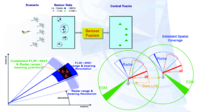
Photo from wikipedia
In this paper, we propose a multi-level cooperative fusion approach to address the online multiple human tracking problem in a Gaussian mixture probability hypothesis density (GM-PHD) filter framework. The proposed… Click to show full abstract
In this paper, we propose a multi-level cooperative fusion approach to address the online multiple human tracking problem in a Gaussian mixture probability hypothesis density (GM-PHD) filter framework. The proposed fusion approach consists essentially of three steps. First, we integrate two human detectors with different characteristics (full-body and body-parts), and investigate their complementary benefits for tracking multiple targets. For each detector domain, we then propose a novel discriminative correlation matching model, and fuse it with spatio-temporal information to address ambiguous identity association in the GM-PHD filter. Finally, we develop a robust fusion center with virtual and real zones to make a global decision based on preliminary candidate targets generated by each detector. This center also mitigates the sensitivity of missed detections in the generalized covariance intersection fusion process, thereby improving the fusion performance and tracking consistency. Experiments on the MOTChallenge Benchmark demonstrate that the proposed method achieves improved performance over other state-of-the-art RFS-based tracking methods.
Journal Title: IEEE Transactions on Multimedia
Year Published: 2019
Link to full text (if available)
Share on Social Media: Sign Up to like & get
recommendations!